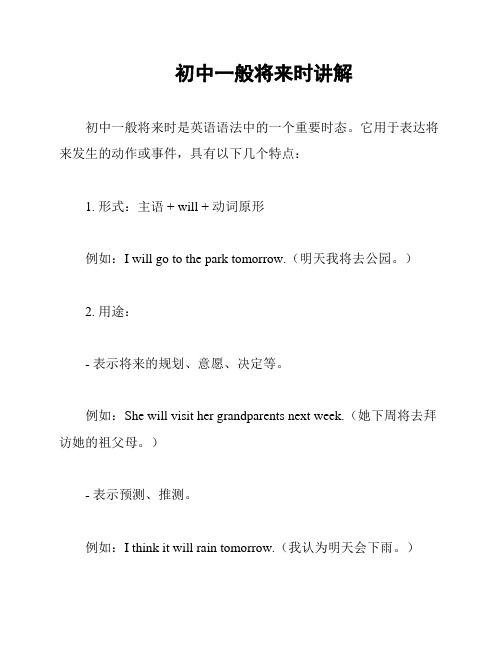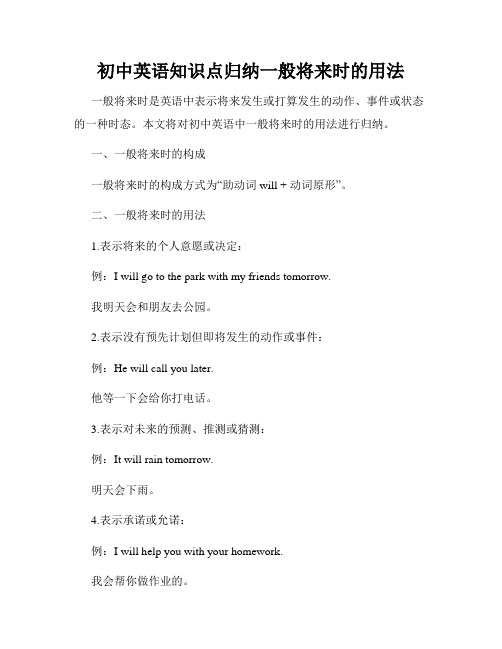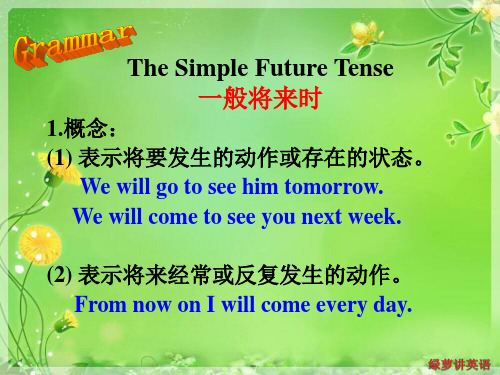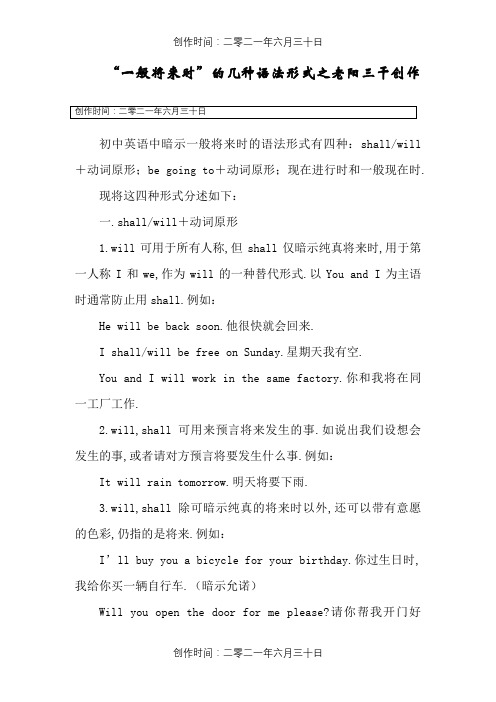初一英语语法之一般将来时
初中一般将来时讲解

初中一般将来时讲解初中一般将来时是英语语法中的一个重要时态。
它用于表达将来发生的动作或事件,具有以下几个特点:1. 形式:主语 + will + 动词原形例如:I will go to the park tomorrow.(明天我将去公园。
)2. 用途:- 表示将来的规划、意愿、决定等。
例如:She will visit her grandparents next week.(她下周将去拜访她的祖父母。
)- 表示预测、推测。
例如:I think it will rain tomorrow.(我认为明天会下雨。
)- 用于官方通知、邀请、警告等场合。
例如:The school will hold a party next month.(学校下个月将举办一次聚会。
)- 用于做出决定或提供帮助。
例如:I will help you with your homework.(我将帮助你完成作业。
)3. 注意事项:- 表示将来的时间状语词一般使用,如tomorrow(明天)、next week(下周)等。
- 一般将来时常与表示将来的时间状语词或时间状语从句一起使用。
- 对于第一人称(I)和第二人称(you)的陈述句,可以使用缩略形式:I'll, you'll。
4. 示例:- She will go to the cinema this evening.- They will have a picnic in the park.- We will study Spanish next semester.- He will go on vacation next month.总之,初中一般将来时是英语语法中的重要时态,可以表达将来发生的动作或事件,同时也可以用于表示意愿、决定、预测等场合。
掌握这一时态的用法有助于学生加深对英语语法的理解。
初中英语知识点归纳一般将来时的用法

初中英语知识点归纳一般将来时的用法一般将来时是英语中表示将来发生或打算发生的动作、事件或状态的一种时态。
本文将对初中英语中一般将来时的用法进行归纳。
一、一般将来时的构成一般将来时的构成方式为“助动词 will + 动词原形”。
二、一般将来时的用法1.表示将来的个人意愿或决定:例:I will go to the park with my friends tomorrow.我明天会和朋友去公园。
2.表示没有预先计划但即将发生的动作或事件:例:He will call you later.他等一下会给你打电话。
3.表示对未来的预测、推测或猜测:例:It will rain tomorrow.明天会下雨。
4.表示承诺或允诺:例:I will help you with your homework.我会帮你做作业的。
5.表示对现在情况的预测或推测:例:She will be here soon.她马上就会到这里。
6.表示征求意见或征询意见:例:Will you come to the party tomorrow?明天你会来参加派对吗?7.表示习惯性或经常性的动作:例:He will often go swimming on weekends.他经常在周末去游泳。
三、一般将来时的否定与疑问句1.否定句构成:在will后面加not。
例:He will not come to the meeting tomorrow.他明天不会来开会。
2.疑问句构成:将助动词will提到句子的主语前面。
例:Will you pass me the salt, please?请你把盐递给我好吗?四、一般将来时的时间状语一般将来时可以与一些表示将来时间的时间状语连用,如:tomorrow,next week,in the future等。
例:I will visit my grandparents next week.我下周会去拜访我的祖父母。
初中英语一般将来时语法精讲

初中英语一般将来时语法精讲初中英语一般将来时语法精讲初中英语一般将来时语法大全精讲【—一般将来时精讲】对于英语一般将来时语法知识的讲解内容,希望同学们能很好的掌握。
一般将来时表示将来某一时刻或经常发生的动作或状态。
①一般将来时的时间状语有:tomorrow,this (afternoon),next (year),one day,now,soon,someday,sometime, in the future, when引导的从句等。
② 用will构成的将来时,表示动作与人的主观愿望无关。
“shall”用于第一人称,“will”用于所有人称。
如:I will graduate from this school soon.(我很快就要从这所中学毕业了)/ You will stay alone after I leave.(我走了之后你就要一个人过了)③ “am/is/are going to+动词原形”表示打算或准备要做的事情,或者主观判断即将要发生的事情,而“am/is/are to +动词原形”表示安排或计划中的动作。
如:A man told them that the woman was to give birth to the special baby.(有一个人告诉他们那个妇女就会生下那个特别的男孩)/ It’s going to rain soon.(天快要下雨了)④ 表示一个人临时决定要做某事,可以用will表达。
如:I will go to the lab to get somechemicals(化学药剂). So please wait until I return.(我要到室去取些药品,请等我回头)⑤ 现在进行时、一般现在时也可以表示将来。
(见相应时态)⑥ shall和will 在口语的一些疑问句中相当于情态动词。
Shall一般与第一人称连用,will与第二人称连用。
如:Shall we go to the zoo next Saturday?(我们下周六去动物园好吗?)/ Will you please open the door for me?(替我把门打开好吗?)⑦ “be to +动词原形”表示按照计划将要发生的事情。
初中英语一般将来时will和be going to讲解课件

going to, 而多用will。 如:
If any beasts comes at you, I'll stay with you and help you.
1.Bob and I _w__il_l_m__a_tc_h__(watch) an action movie tomorrow.
2.We __w__il_l _b_e____(be) able to go to space in the future.
时间状语:
tomorrow 明天
next week 下周
next month 下个月 next year 明天
before不久
soon 不久
the day after tomorrow 后天
the year after next 后年
the week after next 下下周
基本句型: 肯定句: 主语 + will +v. 原形 否定句: 主语 + will +not + v.原形 一般疑问句: will +主语 + v.原形
3.The childrenw_i_ll_d_i_s_cu__ss__(discuss) the plan after school.
He is seriously ill. He is going to die. He will be twenty years old.
2024年中考英语语法复习—一般将来时课件

2)用在由when,if等引导的时间状语从句和 条件状语从句中,表示将来的动作。
If it doesn’t rain tomorrow,we will go hiking. 如果明天不下雨,我们将去远足。
★一般将来时经常会伴随一些时间状语,比较常见的有:
tomorrow
soon
next week下周
练习
1 . There ________ a sports meet next week if it
________.
A.is going to have; doesn’t rain
B.is going to be; doesn’t rain
C.is going to be; won’t rain D.is going to have; won’t rain
Will you go there? 你要去那儿吗?
“Shall I...?”“Shall we...?”常用来征求对方意见。“Will you...?”表示客气的邀请或请求。
Will you please open the window? 请你把窗打开,好吗?
3.否定句:在will/shall后加not,可缩写成 won’t/shan’t 陈述句:I will go there./I shall go there. 我要去那儿。
to +
+其他
not,即主语+be not going
I am not going to watch the video. 我不准备去看录像。
3)一般疑问句:将be
Is he going to see a doctor? 他准备去看医生吗?
4)含有be goi to+动词原形+其他
(完整版)初中英语语法一般将来时态

与一般将来时连用的时间状语
tomorrow 明天 the day after tomorrow 后天 soon 很快
this year 今年 next week 下周 in the future 将来
in three days 三天后
in ten minutes 在一般将来时 中用IN 表示在多久以后
What are they going to do this evening? They are going to watch TV.
What is the bear going to do tomorrow?
It is going to cook dinner.
What are they going to do ?
There will be only one country. 否定句:在will后面加not.
There won’t be only one country. 一般疑问句:把will提到there之前。
Will there be only one country? Yes, there will. / No, there won’t.
一般将来时的主要用法:
1、表示将来某一时刻的动作或状态: We will come to see you the day after tomorrow. There will be a wonderful show next week.
2、表示将来某一段时间内经常的动作或状态: The students will come and work in the lab once a
They will do heavy work.
They won`t do Will they do heavy work. heavy work?
初中英语一般将来时语法总结

初中英语一般将来时语法总结As the school year winds down and the summer sun begins to shine, it's time for middle school students to wrap up their English lessons with a solid understanding of thefuture tense. The future tense is a crucial part of English grammar that allows us to talk about what we're going to do, what we plan to do, or what we think will happen in the future.Let's dive into the future tense with a sense of excitement and anticipation, just like we do when we're planning a summer adventure!The Simple Future TenseThe simple future tense is used to talk about future events that are scheduled or planned. It's formed with the modal verb "will" followed by the base form of the verb.Example: "I will finish my homework after dinner."The Future Continuous TenseThe future continuous tense is used to describe actions that will be in progress at a specific time in the future.It's formed with "will be" followed by the "-ing" form of the verb.Example: "We will be studying for the math test at this time tomorrow."The Future Perfect TenseThe future perfect tense is used to talk about actions that will be completed before a certain point in the future. It's formed with "will have" followed by the past participle of the verb.Example: "By the end of the week, I will have completed all my assignments."The Future Perfect Continuous TenseThe future perfect continuous tense is used to describe actions that will be ongoing up until a certain point in the future and may continue or be finished by that time. It's formed with "will have been" followed by the "-ing" form of the verb.Example: "By next month, she will have been working here for two years."Using "Going to"The "going to" structure is another way to talk about the future. It's used to express predictions or plans that are made at the moment of speaking.Example: "It's going to rain later, so don't forget yourumbrella."Practice Makes PerfectTo master these tenses, it's important to practice using them in different contexts. Write sentences about your future plans, what you think will happen tomorrow, or describe what you'll be doing at a certain time next week.Remember, learning grammar is like planting a garden; it takes time, care, and a lot of watering. But just as a garden grows into a beautiful landscape, your understanding of the future tense will blossom into a strong command of the English language.So, grab your metaphorical shovel and start digging into the future tense. With each sentence you construct, you're building a foundation for clear communication and a deeper understanding of the English language. Happy studying, and may your future be filled with grammatical success!。
“一般将来时”的几种语法形式

“一般将来时”的几种语法形式之老阳三干创作初中英语中暗示一般将来时的语法形式有四种:shall/will +动词原形;be going to+动词原形;现在进行时和一般现在时.现将这四种形式分述如下:一.shall/will+动词原形1.will可用于所有人称,但shall仅暗示纯真将来时,用于第一人称I和we,作为will的一种替代形式.以You and I为主语时通常防止用shall.例如:He will be back soon.他很快就会回来.I shall/will be free on Sunday.星期天我有空.You and I will work in the same factory.你和我将在同一工厂工作.2.will,shall可用来预言将来发生的事.如说出我们设想会发生的事,或者请对方预言将要发生什么事.例如:It will rain tomorrow.明天将要下雨.3.will,shall除可暗示纯真的将来时以外,还可以带有意愿的色彩,仍指的是将来.例如:I’ll buy you a bicycle for your birthday.你过生日时,我给你买一辆自行车.(暗示允诺)Will you open the door for me please?请你帮我开门好吗?(暗示请求)Shall I get your coat for you?我可以为你拿外套吗?(暗示提议)二.be going to+动词原形1.暗示说话人根据现在已有的迹象,判断将要或即将发生某种情况.这类句子的主语可以是人,也可是物.例如:There is going to be a football match in our school tomorrow afternoon.明天下午我们学校将有一场足球赛.(已有告示)I feel terrible.I think I’m going to die.我感到难受极了,我想我快不成了.Look at those black clouds!It’s going to rain.看看那些乌云!天快要下雨了.2.暗示主语现在的意图或现已作出的决定,即筹算在最近或将来进行某事.这种意图或决定往往是事先经过考虑的.例如:He isn’t going to see his elder brother tomorrow.他明天禁绝备去看他哥哥.Mary is going to be a teacher when she grows up.玛丽决定长年夜了当一名教师.3.只是纯真地预测未来的事,此时可与will互换.例如:I think it is going to/will rain this evening.我认为今晚要下雨.注意:(1)be going to和will在含义和用法上略有分歧.be going to往往暗示事先经过考虑的筹算;will多暗示意愿、决心.两者有时不能互换.例如:He is studying hard and is going to try for the exams.他正努力学习,准备介入考试.(不能用will替换)—Can somebody help me?——谁能帮我一下吗?—I will.——我来.(不能用be going to替换)(2)在if之后,通常不用will暗示预言,但可以用be going to暗示意图.例如:If you are going to go to the cinema this evening,you’d better take your coat with you.你若今晚去看片子,最好带着外套.be going to也常可以用于主句之中.例如:If you invite Jack,there’s going to be trouble.如果你邀请杰克,那就要惹麻烦了.如果暗示将来的意愿,will可用于条件从句.此时will为情态动词.例如:If you will learn to play football,I’ll help you.如果你想学踢足球,我可以帮你.暗示位置转移的动词(如go,come,leave,start,arrive,return,send,move,travel,fly 等)和其它几个举措动词(如do,begin,work,spend,play,stay,happen,have,finish,join,eat ,die,meet等)常与现在进行时和暗示将来的时间状语连用,暗示在最近将要发生某事.这些事是事先安插好的.例如:The Browns are coming to dinner tomorrow.明天布朗夫妇要来吃晚饭.What are you doing tomorrow?明天你做什么?The train is arriving at nine o’clock.火车将在九点钟到.在特定的上下文中,这类动词有时也可不带时间状语.例如:—Why?What’s happening?——明天穿你的旧衣服来上学.——为什么?有什么事?1.动词be;暗示位置转移的动词(如go,come,arrive,leave,return等)和暗示“开始,结束”的动词(如start,begin,open,finish,end,close等)与一般现在时和暗示将来的时间状语连用,暗示时间表、节目单或日程表上所安插好的举措或事态将要发生,日程不容易改变,口气肯定.例如:School finishes on January 18th.学期一月十八日结束.Are you free next Tuesday evening?下周二晚上你有空吗?The party starts at four thirty,doesn’t it?晚会四点半开始,是吗?Mr Green leaves Beijing for home tomorrow.格林先生定于明天离京返家.2.在由when,before,as soon as,until/till引导的时间状语从句和由if引导的条件状语从句中,经常使用一般现在时暗示将来.例如:If it doesn’t rain tomorrow,we’ll go to the East Lake.如果明天不下雨,我们就去东湖.I must finish my homework before my mother returns.我必需在妈妈回来之前做完家庭作业.3.在hope后接暗示将来时间的宾语从句中,也可用一般现在时取代一般将来时,hope的主语往往是第一人称.例如:I hope you(will)have a good holiday.我希望你假日愉快.I hope he comes(will come).我希望他会来.练习:将下列句子改为将来时,相应地更改或增添时间状语.(1)I write to him once a month.(2)Lucy is working hard.(3)At what time do you have dinner?(4)Don’t you play football on Saturdays?(5)Do you go to work by bus?谜底:(1)I shall/am going to write to him tomorrow.(2)Lucy will/is going to work hard.(3)At what time will you have dinner?/At whattime are you going to have dinner?(4)Won’t you play football on Saturdays?/Aren’tyou going to play football on Saturdays?(5)Will you go to work by bus?/Are you going to go to work by bus?。
- 1、下载文档前请自行甄别文档内容的完整性,平台不提供额外的编辑、内容补充、找答案等附加服务。
- 2、"仅部分预览"的文档,不可在线预览部分如存在完整性等问题,可反馈申请退款(可完整预览的文档不适用该条件!)。
- 3、如文档侵犯您的权益,请联系客服反馈,我们会尽快为您处理(人工客服工作时间:9:00-18:30)。
初一英语语法之一般将来时
一般将来时
〔一〕、概念:表示将要发生的动作或存在的状态及准备、打算或预备做某事。
句中一般有以下时间状语:tomorrow, next day(week, month, year),soon, the day after tomorrow〔后天〕等。
〔二〕、基本结构:①be going to + do;②will+ do.
〔三〕、否认句:在be动词〔am, is, are〕l后加not或情态动词will后加not 成wont。
例如:Im going to have a picnic this afternoon. Im not going to have a picnic this afternoon.
〔四〕、一般疑问句: be或will提到句首,some改为any, and改为or,第一二人称互换。
例如:We are going to go on an outing this weekend. Are you going to go on an outing this weekend?
〔五〕、对划线部分提问。
一般状况,一般将来时的对划线部分有三种状况。
1. 问人。
Who 例如:Im going to New York soon. Whos going to New York soon.
2. 问干什么。
What do.例如: My father is going to watch a race with me this
afternoon. What is your father going to do with you this afternoon. 3. 问什么时候。
When.例如:Shes going to go to bed at nine. When is she going
to bed? 〔六〕.同义句be going to = will
I am going to go swimming tomorrow. = I will go swimming tomorrow.
1. 我准备明天和伴侣去野炊。
I_____ _______ _________ have a picnic with my friends.
I ________ have a picnic with my friends.
2. 下个星期一你准备去干嘛? 我想去打篮球。
What _____ _____ _____ _____ _____ next Monday? I ____ ____ ____play basketball.
What _________ you do next Monday? I _______ play basketball.
3. 你妈妈这个周末去购物吗?是,她要去买一些水果。
_____ your mother _______ ________ go shopping this ________? Yes, she _________. She ______
________ __________ buy some fruit.
4. 你们准备什么时候见面。
What time _______ you _________ __________ meet?
改句子
5. Nancy is going to go camping.〔改否认〕Nancy ________ going to go camping.
6. Ill go and join them.〔改否认〕I _______ go ______ join them.
7. Im going to get up at 6:30 tomorrow.〔改一般疑问句〕
________ _______ ________ to get up at 6:30 tomorrow?
8. We will meet at the bus stop at 10:30.〔改一般疑问句〕 _____ _____ meet at the bus stop at 10:30.
9. She is going to listen to music after school.〔对划线部分提问〕
________ _______ she ________ ________ _________ after school?
10. My father and mother are going to see a play the day after tomorrow.(同上)
_________ _________ going to see a play the day after tomorrow.
用所给词的适当形式填空。
划出句中表示时间的短语
11. Today is a sunny day. We ______________ (have) a picnic this afternoon.
12. My brother _______________ (go) to Shanghai next week.
13. Tom often ______________(go) to school on foot. But today is rain. He ______________ (go) to school by bike.
14.What do you usually do at weekends? I usually __________(watch) TV and ________(catch) insects?
15. Its Friday today. What _____she _________ (do) this weekend? She ____________ (watch) TV and _____________ (catch) insects.
16. What ___________ (d0) you do last Sunday? I ___________ (pick) apples on a farm. What ______________ (do) next Sunday? I ____________ (milk) cows.
17. Mary ____________ (visit) her grandparents tomorrow.
18. Liu Tao ____________ (fly) kites in the playground yesterday.
19. David ______________ (give) a puppet show next Monday.
20. I ________________ (plan) for my study now。
